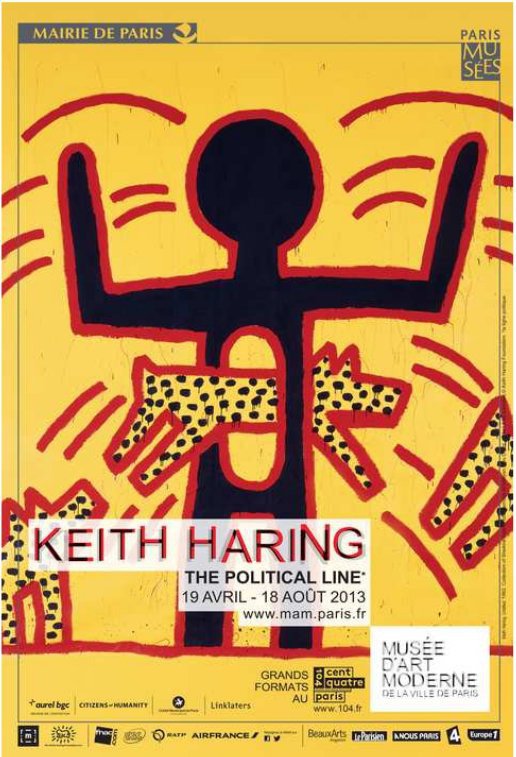Keith Haring
dal 18/4/2013 al 17/8/2013
Segnalato da
18/4/2013
Keith Haring
Musee d'Art Moderne de la Ville de Paris - MAM, Paris
The Political Line. The retrospective presents almost 250 pictures on canvas and tarpaulins and a selection of his monumental works. The layout of the exhibition provides a narrative of Haring's socio-political obsessions. In association with Le Centquatre.

The Musée d’Art Moderne de la Ville de Paris, in association with Le
CENTQUATRE, is devoting a wide-ranging retrospective to
American artist Keith Haring (1958-1990). The exhibition will bear
witness to the importance of Haring's work, in particular its
profoundly "political" content, apparent in his work throughout his
career.
Almost 250 pictures on canvas and tarpaulins and from subway
walls – as well as twenty monumental works – will be exhibited at
Le CENTQUATRE, making this one of the largest presentations of
Keith Haring’s works ever.
Keith Haring was one of the most well-known artists of his time, and even
today his inimitable style, with its strong, graphic line and repertoire of
emblematic signs, remains familiar to all. Beginning with Documenta 7 in
1982, his work was exhibited alongside that of Andy Warhol, Jean-Michel
Basquiat, Roy Lichtenstein, Robert Rauschenberg, Jenny Holzer and
Daniel Buren, as well in museums and biennials around the world.
Haring studied at the School of Visual Arts in New York. Endowed with a
genius for line, this virtuoso draughtsman – even as a child he drew
endlessly – worked rapidly, tirelessly and was enormously prolific,
frequently making work to the accompaniment of music. He worked on all
kinds of surfaces and his response to contemporary media included
disseminating reproductions of his imagery on merchandise, via his New
York retail store, the Pop Shop, which he opened in 1986.
The political messages and ideas he communicated were not only a part
of his legacy; they have had a very real influence on other artists and on
society. His "subway drawings" paintings, works on paper and sculptures
speak of social justice, individual freedom and change. A
subversive, militant Pop icon, Haring was committed to social causes
throughout his life: even when very young, he was driven by an urge to
change the world.
Consciously and frequently choosing the street and public spaces to
make contact with the widest possible audience, he fought indefatigably
against racism, capitalism, violence and injustice in all their forms, with a
particular emphasis on apartheid in South Africa, the threat of nuclear
war, the destruction of the environment, homophobia and the AIDS
epidemic (diagnosed HIV-positive in 1988, he established a charitable
foundation, dedicated in part to helping those affected by AIDS and HIV).
The layout of the exhibition provides a narrative of Haring’s socio-
political obsessions.
Paris was unquestionably the place for this major exhibition. After taking
part in the Figuration Libre France/USA show presented in 1984 at the
Musée d’Art Moderne de la Ville de Paris, together with Robert Combas,
Hervé Di Rosa, Jean-Michel Basquiat and others, Haring became
attached to the city and often stayed, worked and exhibited there.
Le CENTQUATRE takes the retrospective further, presenting a selection of
Keith Haring's monumental works, notably one of his most important
series: The Ten Commandments, dating from 1985. Massive in scale – ten
panels, each seven meters high – the works reveal the artist's radical
interpretation of the Decalogue.
http://www.104.fr/
The exhibition catalogue
This lavishly illustrated catalogue explores the various issues raised by the
exhibition: art in public spaces, government and mass media oppression, the
role of the individual in the social order, etc. It includes essays by critics
specializing in the Haring oeuvre – Dieter Buchhart, Odile Burluraux, Robert
Farris Thompson, Julian Myers, Peter Pakesch – as well as interviews with
Julia Gruen and Tony Shafrazi and a detailed timeline.
The exhibition has been organized in partnership with the Keith Haring Foundation
Image: Untitled, 1982, From the collection of Sheikha Salama bint Hamdan Al Nahyan, Abu Dhabi. United Arab Emirates © Keith Haring Foundation
Press contact:
Musée d’Art moderne de la Ville de Paris: Maud Ohana Tél. 01 53674051 / E-mail maud.ohana@paris.fr
Le CENTQUATRE : Virginie Duval de Laguierce Tél. 01 53355096 / E-mail v.duval@104.fr
Le CENTQUATRE
5, rue Curial 75019 Paris
Open Tuesday-Friday 12 pm - 7 pm
Saturdays and Sundays 11 am - 7 pm
Exhibition open Tuesday-Sunday, 3 - 7 pm
Admission:
Full rate 8€
Concessions 5€
Subscribers 3€
Musée d’Art moderne de la Ville de Paris
11 avenue du Président Wilson 75116 Paris
Open Tuesday-Sunday 10 am - 6 pm
Late closing Thursday, 10 pm
Admission:
Full price: €11
Reduced price : €8 (over 60, teachers, the unemployed, large families)
Half price: €5,50 (young people 14-26 + people on the minimum wage)
Free for the under 14s



